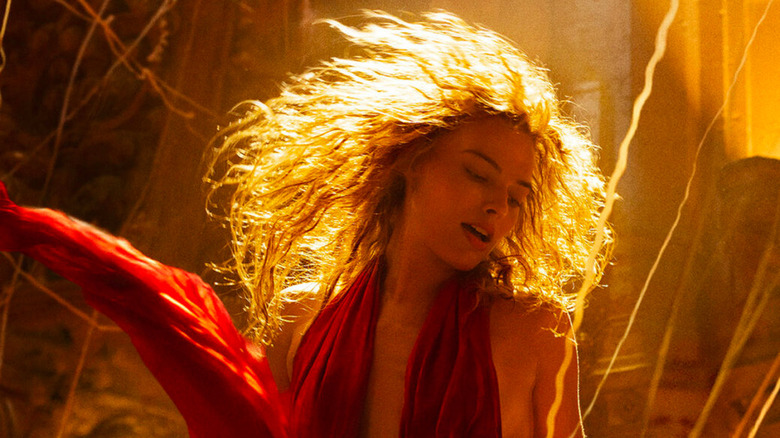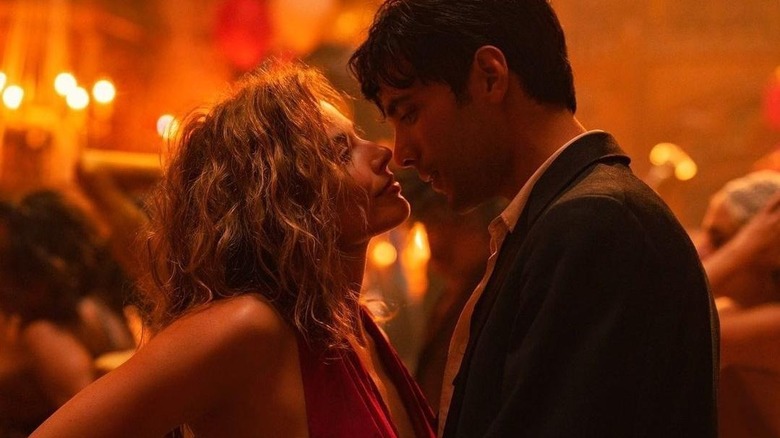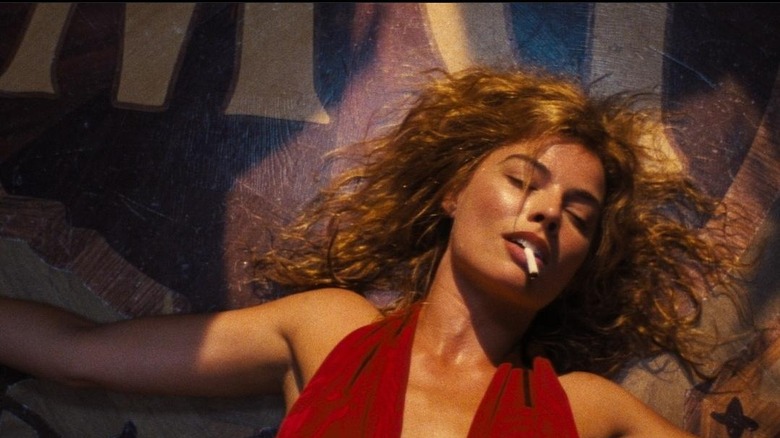
Damien Chazelle is a master at translating the pains of creative ambition into a thriving, energetic cinematic landscape. "Whiplash" traces the educational path of an ambitious jazz drummer in the crosshairs of an exhaustively tough, abusive instructor. "La La Land" tracks the relationship between an aspirant actress and a jazz musician who dreams of his own club, a romance that becomes strained against the realities of the entertainment industry. "Babylon," the largest of the three films in terms of scale, follows a set of early Hollywood players in an era of decadence and upheaval. It's a grandiose, energetic ode to revelry, transformation, and self-destruction as we watch a set of protagonists engage with forces they can neither control nor contain.
"Babylon" takes place in that pivotal early period of Hollywood turmoil when the silent era is overwhelmed by the transition into the talkies. It's an era that's been memorialized before on film before. The fictional silent movie stars of 1952's famed "Singin' in the Rain" suffer when their film is pivoted to a musical and a chorus girl must be brought in to dub their co-star's speaking and singing. 2011's "The Artist" focuses on the relationship between an aging silent film star and a rising young actress in this same era of change. "Babylon" joins this tradition, bringing a fresh focus on early Hollywood decadence before the realities of the talkies' rampant displacement comes crashing in.
The film is a true journey over its three-hour-plus runtime, boasting complex characters with full-throated arcs, a lot of monumental change, strong energy, and a chaotic tone throughout its first two hours. The final hour or so sees the transformations take their toll on the film's protagonists, but in ways that fundamentally dull and slow the film's energy, disperse its narrative logic, drag in pace, and which refuses to end on a number of strong final moments, refusing to end like it's the last silent film star refusing to leave a party that's already concluded. "Babylon" is a film with a number of great elements and a largely solid first two hours, but it continues to plod along and dissipate until one forgets the brilliance of what came before.
An Energetic, Slightly Shallow, Engaging Look At Early Hollywood

"Babylon" follows a set of ambitious characters as they navigate the rapidly shifting Hollywood landscape of the aforementioned era. In the throes of the silent film landscape, fame-chasing hopeful starlet Nellie LaRoy (Margot Robbie at her most electric) shows up at a raucous Hollywood party with a tragic backstory, big dreams, and no money to her name. She meets star-struck Manny Torres (Diego Calva), an immigrant with Hollywood dreams, and the pair hit it off. One Dionysian tribute to revelry later and Nellie finds herself on a silent film set while Manny eventually finds his way to the production of the newest epic of silent star Jack Conrad (Brad Pitt), a charismatic but aging Hollywood legend. On a pair of separate journeys, Nellie's natural sex appeal, charisma, and talent and Manny's intelligence and adaptability send their careers skyward. The popularity of the new sound technology causes havoc among the studios, who pivot to incorporate the new technology. It's a fateful pivot for our characters, as an increasingly out-of-control Nellie new studio exec Manny, and now-out-of-touch star Conrad find themselves adrift.
Diego Calva's Manny Torres is easily the heart of "Babylon," with the film's most poignant and nuanced arc backed by a performance that's truly moving throughout. A stellar turn. Robbie's Nellie is also electric here, a raw, undulating congealment of ambition and Id. She wants it all: fame, lights, vengeance against her doubters, and Hollywood stardom. It's a role that shares performative lineage with some of Robbie's other roles — there's a little Harley Quinn, a little Valerie Voze of "Amsterdam" fame, but here in this context, she's given so many poignant moments and a tragic fall from grace that the similarities are easily forgiven. And if Robbie is the Id of "Babylon" and Calva is its moral core, its' Freudian conscience, Pitt's Jack Conrad is its ego, a man defined by his image in an era of excess. When that image falls away in the chaos of the new era, Conrad doesn't fare all that well.
While Pitt is characteristically great in the role (he could sell Mayo and we'd eat it with a spoon), his role suffers from an ill that plagues many of the characters in Babylon: the film is three hours of Hollywood strivers, and for the most part we see mostly their projected selves, mostly image. We're never allowed to reach in and see the depths of their struggles. Seeing little but their vapid front keeps too much of the film hollow. Energetic, yes, enjoyable often, but we're so surrounded by excess and shallowness that it's surprisingly easy to find the epiphany that we only get to see a one-inch puddle's worth of character depth when an ocean would, at times, be nice. While Pitt's performance is good, only at the end is he allowed to be anything other than an opaque wallpaper affixed over the shell of an aging Hollywood star.
The Chaotic Revelry Of The Beginning Dissipates Against A Plodding, Unfocused Final Third

While Robbie and Calva are clear MVPs in a film that bathes in the shallow end of the Hollywood pool (alongside a scene-stealing speech from Jean Smart), the first two hours of "Babylon" are nonetheless a treat for the senses. The anarchic revelry of the film's first scenes is a riveting boom, while the chaos of the silent era productions is engaging to a fault. "Babylon" is at its best when it's chronicling the ecstasies of the old era and the chaos of early Hollywood. While one rarely feels they're truly seeing into a character, the first two hours are still a riveting look into a hedonistic and bygone era where drunken stars are nearly speared during phone calls and booth operators desperately need unions because, goodness, it gets hot in the booth. The anarchy largely works because it really puts the audience in the Wild West energy of the era, and it isn't until the third hour that everything falls apart.
The last third of the film or so chronicles the unyielding aftermath of the changed Hollywood landscape. Nellie's vices are inhibiting her in a world where the new starlets of the sound era have stronger dedication and a larger set of skills. Jack was already an aging star, but the new need to adjust for sound has hastened the expiration date on his bankability. Manny is the best of them, but he, too, is easily flummoxed by so many new pressures of the emerging system and his world's dark underbelly. With the pivot to their pitfalls, Chazelle's script loses much of the energetic momentum it had while its tone for the finale jumps around wildly. In the new, slower trajectory, memorable moments (like Nellie's bougie party goodbye) are drowned by overlong scenes and diluted poignancy. The precise chaos of the preceding hours is abandoned in favor of a narrative that loses momentum and focus.
The movie's finale caps off the journey with an abundance of endings that makes "Lord of the Rings: The Return of the King" seem decisive. A jaded Manny sees a film, and engages with it essentially despite himself. You can see his visage change, the audience reacting around him, and it's a great and poignant ending that brings the long film home. Except it doesn't end, the film proceeds onward, landing at four to seven further moments that would make for good endings if "Babylon" were to actually conclude, sabotaging all semblance of closure in what feels like an intense bout of cinematic indecision over how to close the show. Between that and other curious choices, the pacing and tone issues of the last hour, and the massive overall length that one really feels as the final 60 minutes drags, the finale blows the goodwill and the energetic momentum of the preceding.
At its best, "Babylon" is loaded with strong performances, incredible energy, eventful scenes evoking the Hollywood of yore, and Linus Sandgren's talented and usually gorgeous 35mm cinematography. That enlivened Old Hollywood anarchy dissipates as the new era takes its toll, but it largely fails to land the tragedy, tone, or ending. One can't help but note the irony of a film about the pivot from the silent era to the talkies having such a loud, booming start but ending with a muffled thud.
/Film Rating: 7 out of 10
Read this next: The Best Movies Of 2022 So Far
The post Babylon Review: A Raucous Ride Through Hollywood's Past appeared first on /Film.
0 Commentaires